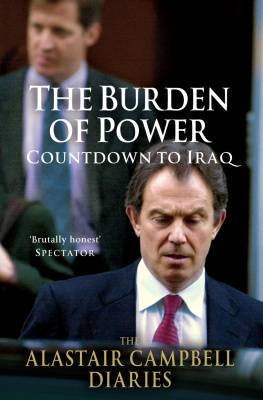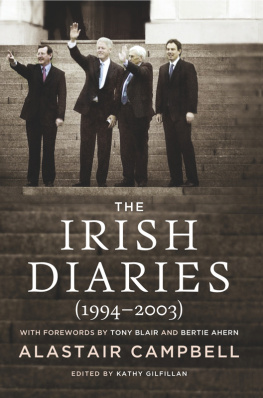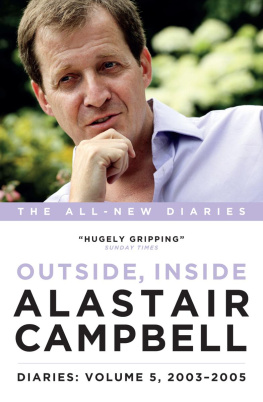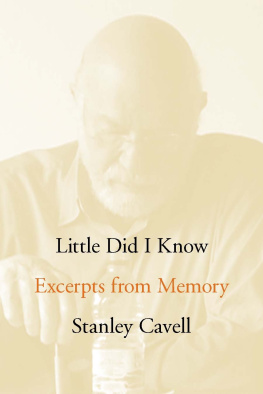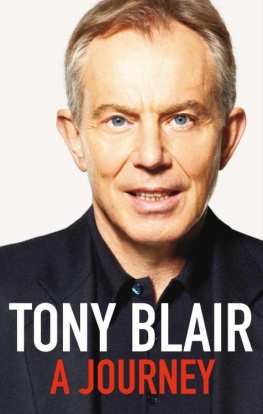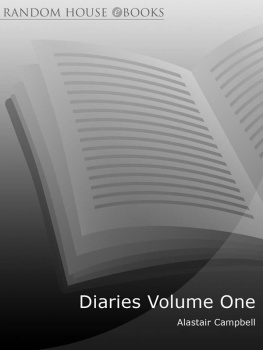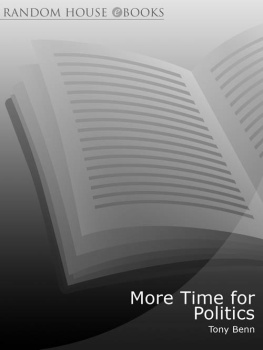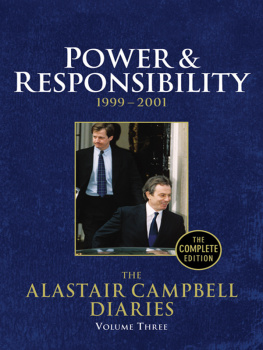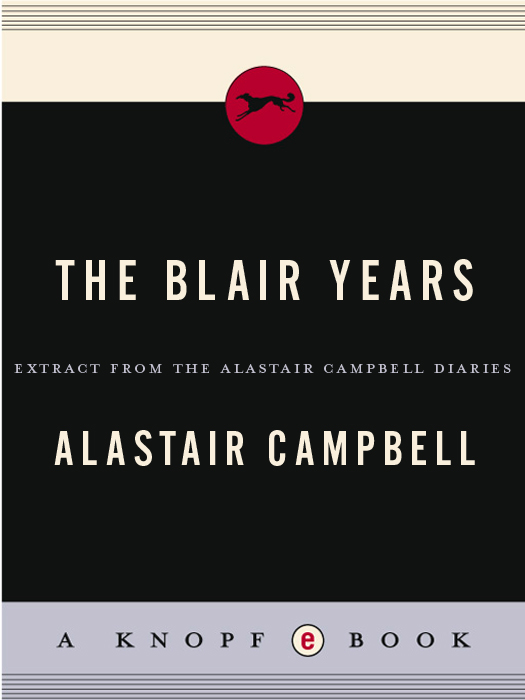This Is a Borzoi Book
Published by Alfred A. Knopf
Copyright 2007 by Alastair Campbell
All rights reserved. Published in the United States by Alfred A. Knopf, a division of Random House, Inc., New York.
www.aaknopf.com
Originally published in Great Britain by Hutchinson, an imprint of the Random House Group Limited, London, in 2007.
Knopf, Borzoi Books, and the colophon are registered trademarks of Random House, Inc.
eISBN: 978-0-307-57440-4
v3.1
Contents
Book One: Preparing for Power
July 1994May 1997
Book Two: Power
May 1997June 2001
Book Three: The War on Terror
June 2001August 2003
For Fiona
Our children, Rory, Calum and Grace
And our parents, Donald and Betty Campbell, Bob and Audrey Millar
Introduction
On May 12, 1994, Labour leader John Smith suffered a heart attack. I heard the news from Hilary Coffman, Johns press officer, as I was on my way to work at the Today newspaper, where I was assistant editor. I could tell from the tone of Hilarys voice that he was in all probability dying, if not already dead. I diverted to the House of Commons, where the news was confirmed to me by a tearful Jack Cunningham, Johns close friend and colleague. Amid the sadness I felt during a long day spent writing and recording tributes, I had two other very powerful instincts. One, that Tony Blair would be the next Labour leader. And two, though Blair and I had never discussed the possibility, that I would work for him.
Even the day before Johns death, a straw poll of opinion formers might well have put Gordon Brown ahead of Blair as most likely leader. But polls are inevitably based upon the question what if? Nobody was expecting John Smith to die that May morning. We were expecting him to lead Labour into the next general election against John Majors governing Tory Party. When a what if? suddenly becomes directly relevant, moods can change and strange things happen. What many people had largely taken for granted that Brown would follow Smith was now being questioned, and the qualities Labour most needed to reverse a series of electoral failures were suddenly, and widely, thought to be best embodied in Blair.
Through that day, as I scuttled back and forth between my office in the Commons and 4 Millbank, where the TV and radio stations covering Parliament are based, I carefully avoided questions of succession. But when, on BBCs Newsnight programme, I was asked direct who I thought would take over, I said what I thought: Tony Blair.
I do not have a great memory one of the reasons I keep a diary. But I do have a vivid recollection of my first meeting with Blair. He had just been elected to Parliament in 1983 and my partners brother, a lawyer, had told me to keep an eye out for the new member for Sedgefield. He is bright, I was told. Very funny, engaging. He is not your average or typical Labour MR. So when I saw him entering the members lobby in the House of Commons, where I was then working for the Mirror, I went over to introduce myself. He was wearing a badly fitting beige suit. He had an enormous smile, which would one day become famous the world over. After a little bit of small talk about family and mutual friends, we were onto a subject both of us spent a lot of time thinking about what more did Labour need to do to win power?
In the ensuing years, I would have numerous such conversations with him, Gordon Brown, Peter Mandelson, Philip Gould, and many others. I worked closely with all four, me as a political journalist who never hid his colours, Gould as a dedicated and obsessive pollster and strategist, Mandelson as first the partys campaigns director and then as an MP, Brown and Blair as the two glittering Labour talents of their generation.
They had flourished under Neil Kinnocks leadership. Under John Smith, Brown and Blair were seen as the youth to complement the older mans experience, but they were often impatient at the pace of change. They did not believe that governments lost elections though John Majors faltering and divided post-Thatcherite administration might help in that process. They thought Oppositions had to win them, and worked tirelessly and restlessly on the policy and strategic decisions they believed essential if Labour were to get back into government.
Brown was always seen as the senior figure, not least by Blair, and the reversal of that position in the wake of John Smiths death would be the source of some considerable tension, creative and not so creative, during the days that followed, and then on and off during the entirety of Blairs 13-year leadership.
Blair came to national prominence on the back of two issues in particular the trade unions and crime. On the first, as employment spokesman, his deft changing of Labours policy on the closed shop established his modernising credentials and, just as importantly, showed he was not scared of a fight. On the second, particularly in the wake of the killing of James Bulger, a Liverpool toddler tortured and murdered by two youngsters, he showed his ability to articulate issues of social concern in a way that others on the left and right of politics struggled to. Tough on crime, tough on the causes of crime, a line hammered out with Brown, was one of his most enduring sound bites when he became Shadow Home Secretary.
But there has always been a lot more to Blair than style and sound bite, good communicator though he is. He joined the Labour Party because it is the party that best captured his own beliefs and values, developed in a comfortable and caring middle-class upbringing, reinforced by a Christian faith that runs deep. But he feared that unless the party adapted to the modern post-Cold War, post-Thatcherite world, it would ossify and die. He was always pushing at the outer edge of modernisation. That modernising zeal was what ultimately made the offer to work for him irresistible. I took some time to think about it. I had a nice life, a young family, a good salary and a growing broadcasting portfolio, so it was not a straightforward decision. I had a reputation for picking fights. I have never been good at hiding what I feel. I have a temper. I admitted to him at the time I was worried about the idea of subsuming my whole ego and persona in someone elses ambition. I had also had a serious psychotic breakdown in 1986 and was concerned that the pressures of the job he was offering might lead me once more down some very dark and dangerous alleyways.
He knew all that. Im not worried if youre not worried, he said. I said what if I am worried? Im still not worried, he said.
I had my partner Fiona, my parents and many friends, Neil Kinnock among them, pleading with me not to do it. They feared it would take over my life, that I would end up loathing the media and getting angry at the share of the load I might have to carry for politicians, who can be a difficult breed. They were right; right too that at times it put an almost intolerable strain on relationships at home. Yet for all that, even with all the Tory and media bile that came my way, I am glad I did it, and grateful for the opportunity he gave me to make a difference in turning Labour from a losing to a winning party, and one comfortable using power to make change.
It was his boldness that finally won me over. On a walk in France in the summer of 1994, he confided that in his first conference speech as leader he intended to launch a review of the old Clause 4 at the heart of the partys constitution, which committed Labour to economic policies it no longer believed in let alone pursued. That boldness shows itself again and again through these pages in his determination to ensure that modernisation of the party cut so deep, across virtually every major area of policy, that the public could not fail to notice it; in the new fairness not favours relationship he forged with the trade unions, which he felt had not fully understood or faced up to change; in his constant driving for an agreed economic approach that set the context for virtually all of the major domestic changes that would follow. It shows itself too in his campaigning skills. On the road, he could be a nightmare to be with, fussing and fretting, engaging in endless circular conversations that seemed to be going nowhere. But then he would decide a course of action, settle himself in his own mind, and reveal himself as a formidable campaigner.


